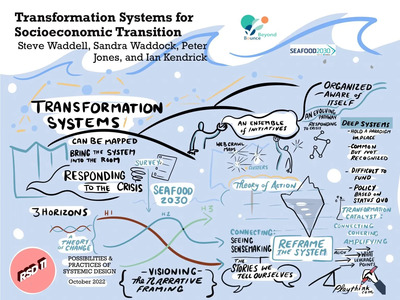Transformation Systems for Socioeconomic Transition
Waddell, Steve, Waddock, Sandra, Jones, Peter and Kendrick, Ian (2022) Transformation Systems for Socioeconomic Transition. In: Proceedings of Relating Systems Thinking and Design, RSD11, 3-16 Oct 2022, Brighton, United Kingdom.
Preview |
Text
Waddell_Deep_paper_2022.pdf Available under License Creative Commons Attribution Non-commercial No Derivatives. Download (861kB) | Preview |
![Waddell_Deep_poster_2022.png [thumbnail of Waddell_Deep_poster_2022.png]](https://openresearch.ocadu.ca/4548/2.hassmallThumbnailVersion/Waddell_Deep_poster_2022.png)  Preview |
Image
Waddell_Deep_poster_2022.png Available under License Creative Commons Attribution Non-commercial No Derivatives. Download (1MB) | Preview |
Abstract
A systemic design approach to purposeful socioeconomic transformation moves beyond idealistic future interventions to address deeply-embedded issues that prevent change here and now. We identify the persistence of consistent “deep system challenges” faced by complex change programs discovered across a range of cases. In the case study of sustainable seafood practices at the industry level, we show the development of the transformation system process and its theoretical and methodological support.
These deep system challenges represent six knots of complex and interconnected problems demanding new organising approaches. These challenges were identified over a wide range of cases and have been studied since 2016 in an ongoing action research programme. The deeply-rooted social complexity of these systemic (wicked) challenges prevents the effectiveness of superficial attempts at quick-gain change in organisations and multi-stakeholder networks where these challenges exist and persist. Shifting these system dynamics is well beyond the capacity of any single or small set of change initiatives. Instead, we argue for an approach that involves catalysing what we call transformation systems into existence and greater transformative power – or a transformation system strategy. A transformation system strategy involves the development of capacities and infrastructures that absorb the complexity of these systems challenges across a network or organisation.
For such expansive contexts as socioeconomic and industry-level transformation, for example, in the present case, the complexly interrelated seafood industry, the organising potential of smaller, faster-paced change initiatives can be mobilised through purposeful transformation systems. These are developed by transformation catalysts that serve as experimental, evaluable system-change deployments that draw resources and prepare networks to form new structures that regenerate the transformation system itself.
| Item Type: | Conference/Workshop Item (Paper) |
|---|---|
| Uncontrolled Keywords: | transition, social system design, system transformation, systemic governance, collaborative action, flourishing |
| Divisions: | Faculty of Design |
| Date Deposited: | 04 Jun 2024 20:17 |
| Last Modified: | 04 Jun 2024 20:30 |
| URI: | https://openresearch.ocadu.ca/id/eprint/4548 |
Actions (login required)
 |
Edit View |

 Lists
Lists Lists
Lists